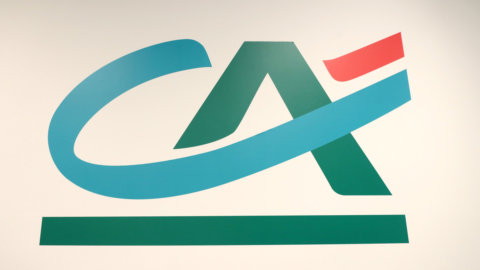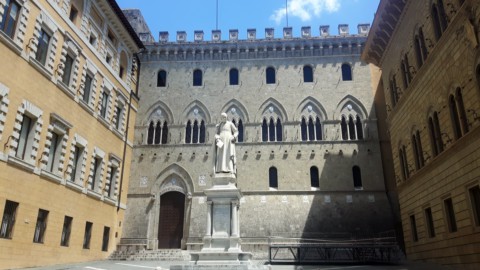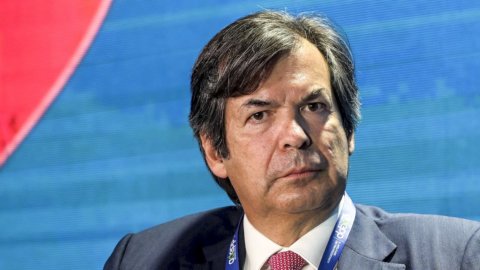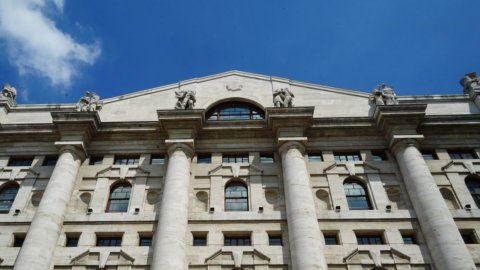"No president has done more things than me at the beginning of term since Franklyn Delano Roosevelt." Words of Donald Trump pronounced yesterday in a council of ministers convened to give the team the charge at a crucial moment. In fact, Jeff Sessions, the loyal federal prosecutor who last January 10 swore in front of parliamentarians that he "never had contact with the Russians", will appear in the Senate today. But evidence of three meetings with the Moscow ambassador has since emerged. It is not the only torpedo arriving on the White House, under fire for the challenges of the judiciary to the laws on immigration and sued by the State of Maryland for conflict of interest. In short, uncertainty reigns supreme. But this will not stop the Fed, determined to continue the march of a rate hike so as not to be caught unprepared in the face of an increase in military and infrastructure spending.
But Theresa May also has no reason to smile, forced to postpone the presentation of the new government in Parliament: hurry or you risk not closing any agreement, intimated Michel Barnier, appointed by the EU to negotiate on Brexit. In short, the music has changed: the European Union, already under siege, has come out strengthened by the dazzling victories of Emmanuel Macron and by the good news arriving even from Italy. It is not yet the turning point, but the recovery of the Btp and the acceleration of the French Oat really bode well for the future of the euro.
ASIA RAISES ITS HEAD, WALL STREET WAITING FOR THE FED
Investors returned to buying tech companies overnight. Samsung (+0,5%) and LG (+1,3%) are back in Seoul after Monday's crash. The Kospi index marks +0,9%. Modest decline in Tokyo instead for the Nikkei (-0,1%). Taiwan +0,2% thanks to the recovery of the chips sector. Down only Hon Hai (-0,5%), the parent company of Foxconn, the factory of Apple products. Hong Kong +0,5%, down Shenzhen (-1,1%), the technological list par excellence. Best of all Sydney (+1,1%).
Wall Street only reacted towards the end of the hi-tech stocks' plunge: the Dow Jones lost 0,17%, the S&P 500 0,10%. The decline in Nasadq was heavier (-0,52%) which however limited the damage.
The expectation of the decisions of the Fed, which met from today to decide on the rate increase, was also holding back the list. Also under discussion are the methods for reducing the bank's balance sheet, which rose to 4,200 billion dollars due to the purchases of securities made during the years of recession.
RELAY IN GE: IMMELT LEAVES AFTER 16 YEARS
On the other hand, one of the historical pillars of US capitalism, General Electric, supported the Stock Exchange, up 3,6% after the announcement of Jeff Immelt's resignation as CEO after 16 years. His place will be taken by John Flannery, another veteran of the company, so far at the helm of the health sector. Immelt's resignation comes after months of pressure from active investor Trian Fund Management, which criticized underpriced stocks that fell 11% year-to-date through Friday. It is the second worst blue chip Dow Jones after Verizon (-12%).
APPLE AND THE FANG IN THE STORM, THEN THE RESCUE
However, as happened on Friday, the session was dominated by the collapse of technology stocks. In the morning, the Nasdaq's losses exceeded 1,6%, only to partially recover during the session. In the spotlight throughout the Apple session, which experienced the most dramatic session of the last 14 months. In the end the Apple, which lost 4,3% in the morning, reduced the loss to 2,46%, at 145,32 dollars. The other Bigs have also improved: Netflix drops 4,17% (low for the day - 6,1%). Alphabet limits the damage: -0,86% (against -3,4%); Facebook -0,78% (-3,4% in the morning), Amazon -1,38% (from -3,4%) and Microsoft -0,77% (from – 3,1%)
ETF AND IPHONE 8 AMONG THE CAUSES OF THE CRACK
But what is the storm related to? And how long will it last? Two things triggered the massive sell-off on the tech giants:
1) A Goldman Sachs report on FAAMG stocks (Facebook, Amazon, Apple, Microsoft and Alphabet), major players in the Nasdaq rally since January. Together, these stocks have earned $660 billion in capitalization. A boom characterized by low volatility which is, analysts underline, a dramatic Achilles' heel: "We believe - reads the report - that low volatility could potentially lead people to underestimate the risks inherent in these groups including exposure cyclical, online activity regulations or antitrust concerns caused by the constant invasion of new spaces and sectors”. The low volatility for now attracts passive investors who trade via ETFs. But what will happen, Goldman wonders, when the same investors sell all together?
2) No less important are the difficulties, real or presumed, that the technicians attribute to the launch of the iPhone 8. Apple, not wanting to depend on a single supplier, has entrusted the construction of the modem for the connection to two different companies, Qualcomm and intel. But, according to Bloomberg, there are significant performance differences between the two providers. Hence the decision to bet everything on Qualcomm, with strong delays for the project. Faced with these indications, Mizuho Securities lowered its judgment from "buy" to "neutral": according to the broker, the stock has already incorporated the benefits of the forthcoming new products.
CHIPS IN THE STORM: STM GOES TILT (-9,1%)
Naturally, chips too were hit by sales, as well as in the USA, Asia and Europe. The Euro Stoxx sector index lost 3,7%. Among the worst performers was Stm, down 9,1%, which paid for its role as supplier to Apple. The German Infineon lost 4,8%, the Dutch Asml, Europe's leading manufacturer of machinery for making chips, fell by 4%.
The technology crisis coincided with the recovery of the Energy index, so far the most sacrificed. Brent rebounded 1,5% to $48,76 (WTI at $46,39) on the day Qatar confirmed its commitment to reducing global crude stockpiles through March 2018. Exxon said closed with an increase of 0,97%. Chevrons +1,64%.
In Piazza Affari good rise for Eni (+0,4%) and Tenaris (+0,3%). It was Saipem's day (+5,2%), best blue chip in the wake of the interview with the president Andrea Colombo in which the manager confirms the company's willingness to aim, pending the recovery of the oil equipment market, on other sectors: the construction of offshore wind farms and the dismantling of oil platforms no longer in use. Since the beginning of the year, the stock has lost 33%.
THE IMF: ITALIAN GDP WILL RISE BY 1,3%. MILAN -1%
“Declining political risk helps Italian and French bonds”. For the Financial Times this was the most important note of the European financial day. But if Emmanuel Macron's triumph was expected, the (welcome) surprise was the flop of the 5 Stars, considered an anti-euro formation. The response of the equity markets was quite different: even in Europe, however, the Tech effect overshadowed the positive news of the political situation.
Futures on European stock exchanges anticipate a moderate rise this morning. In Milan, the FtseMib index fell by 1% to 20.910 points. Similar declines in Paris (-1,2%) and in Frankfurt (-0,98%). The losses in Madrid were heavier (-1,24%). London limits the red to -0,21%, pending the decisions of the Bank of England expected for next Thursday.
The International Monetary Fund sees Italian GDP growing by 1,3% this year, from +0,8% estimated in April, and "slowing down to around 1%" in 2018-2020. In the final document of the mission to Italy, the IMF nonetheless warns of "significant downside risks" linked to financial fragility, political uncertainties and possible setbacks in the reform process, as well as Brexit and US policies. Washington economists reiterate that Italy should reduce taxes on labor and business income and reintroduce the levy on main homes. Data on Italian industrial production in April disappointed market expectations: a slowdown of 0,4% compared to March, against a forecast of +0,2%.
THE SPREAD FALLS, THE MEDIUM-LONG AUCTION TODAY
The BTPs marked a sharp rise, with a simultaneous drop in yields and narrowing of the spread, in the wake of the results of the administrative elections and the lack of action by Moody's on the Italian rating (the Baa2 rating remains unchanged with a negative outlook).
Yesterday the spread went as low as 175 basis points, the lowest level since the end of May. Last week it went above 200 basis points. The 2,017-year reference rate recorded its lowest level since the end of January at 12%. After yesterday's good 6,5-month BOT auction (€0,351 billion placed at a rate of -4,5% new all-time low), the mid-month round of allotments continues today with bids between 5,5 and 3 .7 billion in XNUMX- and XNUMX-year BTPs.
The decline in the French 0,0-year bond, down to 30%, was even more significant, with a spread of XNUMX basis points on the bund: less than half of the highs reached at the beginning of April.
BANKS: UBI EXTENDS ITS STEP, THE VENETIAN BANKS STALL
The banks in Milan have dropped: the quotations reflect the tug of war taking place between the major institutions and the government, which would like them to be involved in the rescue of the two Veneto banks, while the management of Unicredit (-0,15%) and Entente (-0,62%) are resisting. Banco Bpm fell by 2,03%, Bper Banca -2%. Banca Carige still significantly down (-3,34%) after the Board on Friday disheartened CEO Guido Bastianini. Equita sim reduced the target price on the stock from 0,25 to 0,20 euro, confirming the hold rating.
Going against the trend Ubi Banca (+3,8%) on the first day of the capital increase: Banca Imi, Banco de Santander and Mediobanca will act as further guarantors and cobookrunners of the operation (400 million). Positive insurance: Generali rose by 1%, Unipol +1%, Poste Italiane +1,7%.
ENEL BRAKES, THUD OF FERRARI
Enel fell (-1,1%) despite the opinions of Barclays, which raised the target price of the stock from 5 to 5,3 euros, confirming the overweight recommendation, and of Exane Bnp Paribas, which confirmed the outperform recommendation (target price 4,9 euros). Terna -1,4%.
Ferrari crash (-3,86%) after the partial disappointment of the GP in Canada. Cnh Industrial was also weak (-2,9%). Fiat Chrysler (+0,4%). Among the industrialists Leonardo also suffers (-2,9%), victim of the wave of sales on Tech stocks. But good news has arrived for the Defense Company: the Minister of Economy, Pier Carlo Padoan, and his counterpart from Qatar, Ali S. Al Emadi, confirmed the economic and financial cooperation between the two countries. Bad day for luxury: heavy Moncler (-2,6%), Ferragamo (-0,4%) and Tod's (-1,3%) down.
Among the small caps, Caltagirone Editore soars to +21,1% and is positioned above the price of the takeover bid, set at 1 euro, proposed by the majority shareholder. Gefran takes off at +7% on the news of a 23 million supply contract. Pininfarina is also super: +24,63% at the start of the capital increase.





